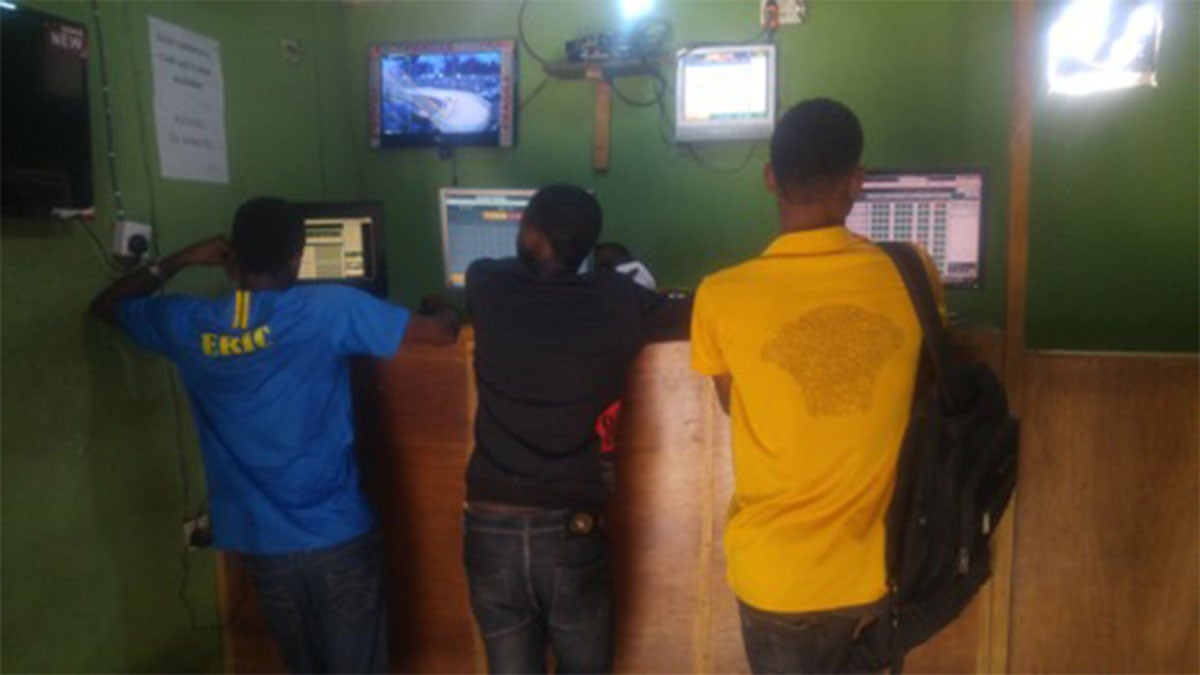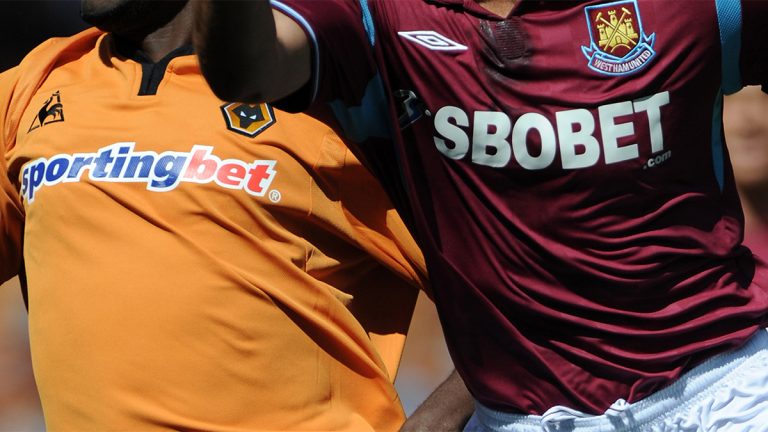Kenyan, Nigerian governments addressing rampant youth sports gambling
Why this matters
Widespread youth sports gambling is forcing the Kenyan and Nigerian governments to assess ways to curb the illegal activity, which can lead to exploitation, criminal activity and damage children's futures.
Gambling has taken place, one way or another, for thousands of years, and is inextricably linked to the history of humanity.
From ancient China, where indications of rudimentary games of chance were discovered on tiles, to Egypt, where the oldest known dice were excavated, to scenes of gladiators on Greek and Roman pottery indicating betting on animal fights was common, humans love to gamble and do so at every opportunity.
But just like using tobacco, gambling can be addictive. And with the increase of modern technology, gamblers now have access to it on their phones or from a neighborhood betting shop.
Globally, sports betting is on the rise, and that causes grave concern to national leaders who understand their youth are not immune to this new beast in town. And while the sports betting business is a problem globally for youth, in Africa — and Kenya in particular — with its youthful population, the situation is reaching unprecedented proportions. For teens, their love for football has made them the prime target.
Kenyan child development specialist Jennifer Kaberi, while addressing the menace of sports betting among underage kids, told the BBC: “All these children are being swallowed by this animal that came in, and people didn't realize it was an animal.”
Speaking about the risk involved in betting she added, “Children cannot get employed, so where do they get the money from? They either borrow from their parents or steal it from someone. If they borrow from someone, they will need to repay it, and the repayment can be in all forms of sexual exploitation for the girls."
While speaking about the surge of sports betting in Africa, Dr. Darragh McGee, a University of Bath lecturer, opined that gambling addiction, if not properly curtailed, could become a public health crisis. “We have reached the point here, particularly in the U.K. and in Europe, where we have a saturated sports gambling market, and if we reach back two decades to the tobacco industry of the ’90s, it seems inevitable that the African continent particularly noteworthy for having the largest growing youth demographic on the planet, it seems inevitable that we would see the extension of the gambling industry into the continent. This becomes a public health issue and perhaps even a public health crisis.”
In an effort to curb the sports betting addiction among youth, the Kenyan government, in April 2019, banned gambling-related advertisements between 6 a.m. and 10 p.m., as well as celebrity endorsements of gambling.
Under the new rules, any gambling advertising needs approval by the gaming regulator and will be required to contain a warning message that must constitute a third of the actual advertisement.
"76 percent of youth in Kenya are bettors — this is the highest figure in Africa, while half a million have been blacklisted by lenders because they borrowed to bet and failed to pay back." - Kenyan Interior Minister Fred Matiang'i via Twitter
Citing how devastating a sports-betting addiction among the Kenyan youths can be, Kenya’s Interior Minister Fred Matiang’i said in a statement: “Rogue behaviour in the betting and lotteries industry is endangering the lives of our young people.
“This clean-up has just started and we will carry it through no matter what it takes, because young Kenyan lives are worth saving,” Matiangi said.
“76 percent of youth in Kenya are bettors — this is the highest figure in Africa, while half a million have been blacklisted by lenders because they borrowed to bet and failed to pay back,” the minister said, according to his ministry’s Twitter feed.
Kenya is not alone in battling sports-betting addiction among its youth. Nigeria faces the same problem, and it's enormous.
In the streets of Lagos, betting shops are easy to find. While on the walls of the shops are warnings that betting is for those older than 18, the truth is the owners of these shops do little or nothing to verify the ages of their customers, even though many are easily identified as underage.
A sign post in Awolowo Road, Ikeja, Lagos, Nigeria by the Lagos gaming body boldly warns “Don’t bet with your house rent.”
No doubt this is a step in the right direction, but the question remains: Is it enough?
Effect of gambling among underage bettors

By definition, gambling means taking a chance on an uncertain outcome, and that there is a risk of loss along with the chance of profit. It is that chance for profit that motivates many gamblers, but the opportunity for loss can be even greater.
For example, many gamblers lost heavily on Aug, 31, 2019, when both Chelsea and Barcelona, respectively, drew to weaker teams. The problem grows when individuals lose but don’t stop. Instead, they hope to win back what they have lost and, in the process, continue losing.
Gambling has eroded the traditional values of hard work, resilience and persistence. Stories of overnight successes by these bookmakers have been carefully tailored to manipulate these underage bettors. Youths no longer want to work. Bet and become a millionaire from less than a dollar stake.
Traditionally, people met to watch games because they loved it. These days, people are flocking to ascertain whether their picked team has won, and if the "bet has gone through."
Are the hands of parents tied in helping their kids combat sports betting addiction?
While the Kenyan and Nigerian governments are trying to slow the spread of youth sports betting, there are steps parents can take as well.
Nigerian guardian counselor Emeka Ngige, who also majored in gambling addiction counseling, believes parents or guardians play a major role in helping prevent or combat problem gambling. Ngige stressed that parents must talk to their children about family values regarding money, competition, and the place betting has as a recreational activity. Parents must pay attention to what values their kids are developing.
He said the discussion must take place in a way children can understand.
Ngige added that parents must explain as calmly as possible, without scolding, why a gambling problem is damaging to the individual as well as his friends and family.
The Nigerian counselor said he advises clients with gambling addiction to develop new skills and interests and spend their spare time pursuing them. This method, he explained, was the most effective way of helping most gambling addicted patients.
Ngige added that parents can help prevent gambling addiction among their kids by building a trusting relationship with them and by balancing their kids’ need for independence with their own need to monitor the attitudes and behavior of their kids related to gambling.
Combating sports addiction among underage bettors
Combating any form of addiction is never easy, and the same applies to sports betting. Sometimes, the bigger problem is actually acknowledging that betting has become a problem in one’s life. Many think their gambling habit is normal, wishfully thinking they are just a win away from “making it in life.”
Some self-help questions may help a person ascertain their gambling status:
- You can’t stop even when you want to?
- You gamble with money you can’t afford to lose.
- Your bets go beyond entertainment and leisure.
- You attempt to recover losses by betting more.
- You don’t set a limit to what you can afford to lose.
- You go to the extreme to find money to gamble.
- You put gaming before important things in your life.
If a person can answer yes to most of these questions, they are likely suffering from problem gambling.
On a broader scale, governments and gaming licensing boards must continue to enforce the laws against underage gambling, including restricting the underaged from gaining access to betting shops, and the officers of these regulatory bodies must carry out routine undercover checks on betting shops to ascertain adherence.
Arinze Esomnofu is a Nigerian media professional, content editor and a freelance journalist. He is currently the country manager for Flashscore Nigeria





